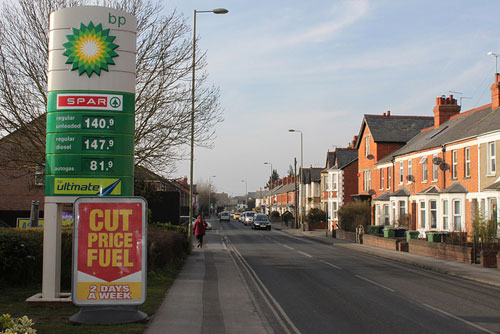The concept of hidden taxes is that taxpayers may remain unaware that they are paying the tax because it is included in the price and the tax is not visible.
Examples of hidden taxes include
- Indirect taxes – VAT, sales tax, excise duty, Insurance tax, air passenger duty.
- Corporation tax – a tax on company profit hidden to the majority of taxpayers such as shareholders, though company owners will be aware.
- Tariffs – when buying food from a supermarket, the consumer will be unaware of any import tariffs which are included in the price.
The price of petrol and hidden tax

When you purchase petrol, tax is automatically included in the price.
The UK has one of the highest tax rates on petrol/diesel in Europe – roughly 60% of the final price of petrol goes to the government in excise duty or VAT.
- Excise duty on petrol is 58p per litre
- VAT is 20%
- Production costs are around 50p.
- Profit margins are around 5-10p.
This shows the extent of hidden taxes in a product like petrol.
Air-passenger duty
If travelling from the UK to a city over 2,000 miles away, the standard rate of passenger tax is £172. This is hidden from consumers as it is included in the final price of the air ticket. The passenger may only be aware of the tax if they ask for a refund from a non-refundable ticket. The airline will not refund the actual fare, but they can refund the passenger tax because if they do not fly, it is not paid.
Sales tax which is not hidden
In the US, many states add sales tax onto the marked price in the shop. If you buy a coffee for $2, when you purchase the coffee, the final price may be $2.18 (with sales tax of 9%). In the US this sales tax is visible as the consumer can see the difference between the final price and the pre-tax price.
In Europe, the sales tax (VAT) is included in the final price. Unless the consumer looks at receipt carefully, they will not be aware of how much the tax is for the good. Some receipts do not show the tax at all. For example, if you purchase a beer in a pub, the receipt would not show the excise duty and VAT – It is the responsibility of the landlord to pay the taxes directly to the government.
Pros of hidden taxes
- Excise duties may be levied to influence consumer behaviour and reduce demand for demerit goods and goods with negative externalities.
- It is more efficient for the market price to already include the tax – it avoids awkward prices like $2.18 and dealing with loose change.
- Consumers benefit indirectly from hidden taxes through higher government spending.
Cons of hidden taxes
Excise duties, such as cigarettes and alcohol tax are often highly regressive. But, because demand is inelastic, raising cigarette taxes is an easy way to increase government revenue.
Hidden tax increases and inflation
Inflation can cause a rise in taxation – without any increase in tax rates. For example, if there is a higher marginal tax rate of 50% on incomes over £40,000. If there is inflation and rising nominal wages, more workers will enter into this higher tax band. If the government keeps the tax band constant, then more people will automatically be eligible to pay the higher tax. This is slightly different to the concept of a hidden tax but is related.
Related
